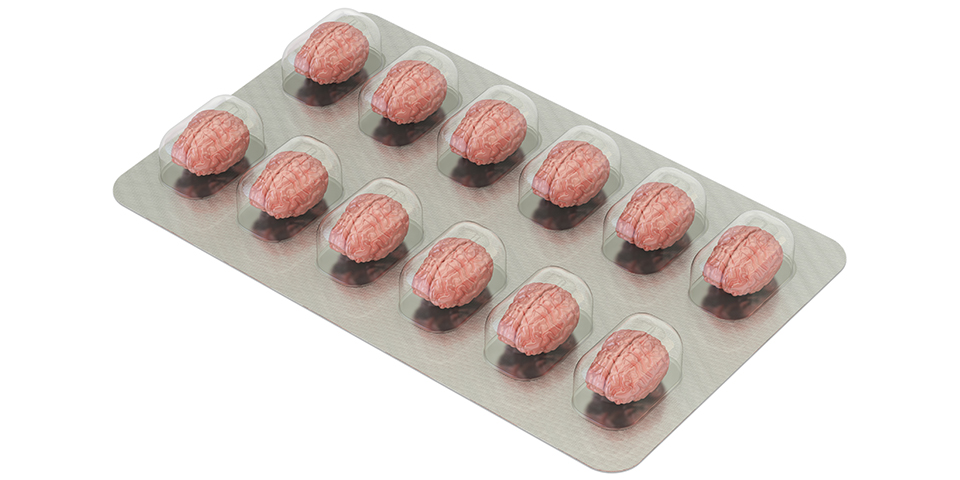Life these days is… a lot. While there’s no way to add more hours to the day or magically erase your to-do list, more and more people are looking for ways to stay at the top of their game.
That’s where nootropics, said to help support healthy brain function, mental clarity, and cognition,* come in.
Some of these substances have been used for centuries, but they’re also super popular right now since they offer support for some decidedly modern issues.
Read on to learn what nootropics are exactly, whether they’re safe (yes, but there’s more to it!), and whether they can really make an impact.
What Are Nootropics?
“Nootropics are something you take to improve your mental capacity or cognitive function,” explains Paul Falcone, senior scientist, Scientific Affairs, at Beachbody.
Nootropics get their name from two Greek words: noo and tropos, meaning mind and turn. They help support focus, attention, and mental clarity.
“Some nootropic ingredients have been shown in clinical studies to help support areas of cognitive function, such as reaction time, attention, and alertness,” Falcone says.
However, nootropic supplements are not “smart drugs.”
On the natural health side, “nootropics are typically herbs that have been found to help support cognitive function,” says Dr. Alissia Zenhausern, NMD, a naturopathic physician at NMD Wellness of Scottsdale, Arizona.
Not all nootropics work the same way. To be categorized as one, a substance needs to influence brain health and cognition.
“Different compounds have different effects,” Falcone explains. “Many nootropics act upon various neurotransmitters, which are chemical messengers in the brain.”
Are Nootropics Safe?
As with any substance or supplement, quality matters when it comes to choosing nootropic supplements.
The safety will depend on the product. At Beachbody, our ingredients and formulas are rigorously tested for quality, purity, and potency.
Before taking any supplement, do your research and talk to your healthcare provider first. Herbs can interact with certain medications, and some are contraindicated for people with specific health issues.
And, taking any medication that was not prescribed to you for a specific function can be dangerous — not to mention illegal.
Common Over-the-Counter (OTC) Nootropics

Plenty of nootropics are available without a prescription.
The oldest, best-known, and most commonly used one that you might be sipping as you read: caffeine. In your morning coffee or in other forms, caffeine will wake you and your brain.
Caffeine can help support mental clarity, alertness, and focus.* On the other hand, too much caffeine can cause jitteriness. That’s why many premium supplements that support brain function and health — such as Beachbody’s supplement combo FIRST THING and LAST THING — include only a small amount of caffeine as part of a larger formulation.*
“In FIRST THING, there’s only a small amount of caffeine coming from the green tea,” Falcone explains. “As part of the energy blend, green tea contributes to supporting energy and healthy vitality.”*
The nootropic blend in FIRST THING includes coffee cherry extract, sage extract, bacopa monnieri, eleuthero root, lion’s mane mushroom, and phosphatidylserine, Falcone says.
“These ingredients were chosen because they have different mechanisms of action on the brain, and when blended together, they can support both brain function and brain health,” he explains.
Here’s a rundown of other OTC herbal nootropics:
L-theanine for calm focus
Found in some green teas, L-Theanine is a phytochemical that has been shown to help promote “relaxation, tension, and calmness” in a review of human studies.
Ginkgo biloba for brain health
A well-known herb for brain health, Ginkgo biloba shows mixed results. Small studies — for short-term use or for reducing cortisol levels — have used an extract far stronger than what’s available in stores.*
Lemon balm for calm and focus
Lemon balm can “help boost the relaxation neurotransmitter GABA in the brain to help reduce the effects of stress,” says Zenhausern.*
Gotu kola for overall brain health
Common in Ayurvedic and Asian practice, gotu kola has historically been used to help support working memory and support brain health.*
A 2016 study, however, suggested that further research is still necessary to confirm its potential.
Cat’s claw for brain function
A plant native to the Amazon, “Uncaria tomentosa has been used for centuries to support brain function,” explains Zenhausern.
Racetams
This is a class of medications that includes piracetam, aniracetam, levetiracetam, and oxiracetam.
However, racetams are generally used to treat seizure conditions and cognitive conditions, not to boost focus and brain power.
Can Nootropics Make You Smarter?
Popping some gotu kola or loading up on caffeine before a test isn’t a substitute for studying. That’s not how nootropic supplements work, according to Falcone.
“One misconception is that nootropics will raise your I.Q. and make you a genius,” Falcone says.”They will not give you superhuman abilities; instead, nootropics work to help support cognitive functions, such as attention and reaction time, to help you feel your best,” he explains.
Think of nootropics as being able to help clear the clutter from your brain and keep you focused on the task at hand.
They won’t write your big sales report for you (and they can’t help you pull an all-nighter to get it done), but nootropic supplements may support better focus and clarity to help you get it done using your already stellar brainpower.*
*These statements have not been evaluated by the Food and Drug Administration. These products are not intended to diagnose, treat, cure, or prevent any disease.

